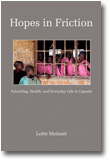
Hopes in Friction
Schooling, Health and Everyday Life in Uganda
By:
Lotte Meinert, Aarhus University
A volume in the series: Education Policy in Practice: Critical Cultural Studies. Editor(s): Rodney Hopson, American University. Edmund Hamann, University of Nebraska-Lincoln.
Published 2009
Universal Primary Education programs are being promoted around the globe as the solution to poverty and health problems, but very little in-depth qualitative knowledge is available about the experiences of these programs in children's life-worlds.
Hopes in Friction offers a vivid portrait of life and the implementation of Universal Primary Education in Eastern Uganda, based on long-term fieldwork following a group of children as they grow up. The book considers how the actions and hopes of these children and families, to attain what they perceive as 'a good life', are crosscut by political aspirations and projects of schooling and health education. When hopes are in friction inspiration as well as disappointment occur.
Policy makers in Uganda and in international organisations expect health improvements as one of the bonuses of education programs. Families in Eastern Uganda also hope for and experience health – in the local sense of a good life – as part of schooling. Lotte Meinert explores the taken for granted effect of schooling on health and focuses a careful eye on how boys and girls appropriate and negotiate ideas and moralities about health in the context of what is possible ethically, materially and experientially.
CONTENTS
Acknowledgements. 1. Introduction. 2. Exploring Children's worlds in Kwapa. 3. Universal Primary Education as a critical event. 4. Elliptical tracks: Becoming an educated and healthy citizen. 5. Health lessons in school. 6. Learnedness and the good life. 7. Sickness and unity in families: The virtues of care. 8. The appropriation of schooling for health. 9. Conclusion: signing out of school. Notes. References. Index.
REVIEWS
"Hopes in Friction gives us fi rst-hand insight into the aspirations and ideals of Ugandan schoolchildren. Meinert shows us how local communities shape and reshape health education policies. Like two sticks rubbed together, top-down programs and bottomup perceptions of well-being grate to produce sparks of hope. This work makes an important contribution to a growing literature on schooling in contemporary Africa." Professor Amy Stambach author of Lessons from Mount Kilimanjaro
"What do we learn when we go to school? Among other things, Lotte Meinert reminds us, children learn the bodily techniques of a hierarchical modernity: standing in lines, singing during parades, bending to be caned, sitting at desks. Within this frame, formal abstractions about health care in the eastern Ugandan primary school curriculum are not translated into domestic practice. Yet this lively and insightful book holds further surprises. School children do use their education—for example, to mediate for their parents with disrespectful health professionals. Hopes in Friction exemplifies the power of the anthropological gaze to move us outside the narrow confines of educational policy debates, allowing us to re-examine both the dead-ends and promises of schooling." Professor Anna Tsing University of California–Santa Cruz
"Lotte Meinert has given us a rich and original book on children and “the good life†in Uganda. It is ethnographically sympathetic and closely observed, and at the same time conceptually and analytically sophisticated. By bringing schooling together with a radically social view of health, she comprehends the most fundamental concerns of Ugandan families. By problematizing moralities, resources and competences, she provides an innovative contribution to discussions of education policy and to the anthropology of childhood, health and schooling." Professor Susan Reynolds Whyte University of Copenhagen
-
Paperback978-1-60752-004-7
Web price: $45.04 (Reg. 52.99)
-
Hardcover978-1-60752-005-4
Web price: $80.74 (Reg. 94.99)
- eBook9781607528791

-
 Educated for Change?
Muslim Refugee Women in the West
Educated for Change?
Muslim Refugee Women in the West
-
 Learning to Hide
The English Learning Classroom as Sanctuary and Trap
Learning to Hide
The English Learning Classroom as Sanctuary and Trap
-
 Navigating the Volatility of Higher Education
Anthropological and Policy Perspectives
Navigating the Volatility of Higher Education
Anthropological and Policy Perspectives
-
 Paths to the Future of Higher Education
Paths to the Future of Higher Education
-
 Researching Race in Education
Policy, Practice and Qualitative Research
Researching Race in Education
Policy, Practice and Qualitative Research
-
 Revisiting Education in the New Latino Diaspora
Revisiting Education in the New Latino Diaspora
-
 The Construction, Negotiation, and Representation of Immigrant Student Identities in South African schools
The Construction, Negotiation, and Representation of Immigrant Student Identities in South African schools

